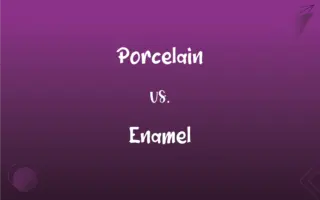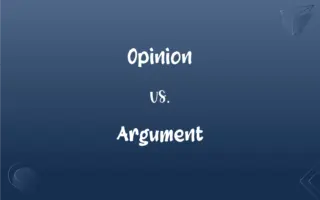Depart vs. Departure: What's the Difference?
Edited by Aimie Carlson || By Harlon Moss || Updated on November 2, 2023
Depart is a verb meaning to leave, especially to start a journey. Departure is a noun referring to the act of leaving or a point at which something starts.

Key Differences
Depart is a verb that signifies the action of leaving a place, often to begin a journey. It is used to describe the action taken by an individual or a vehicle. Departure, as a noun, represents the concept or instance of departing, often marking the beginning of a trip or the point at which something diverges from a usual route or method.
When you depart, you are actively engaging in the process of leaving. Departure refers to the event or time at which the departing occurs. It is not the action itself but the occasion or the instance of the action. While "depart" is focused on the action, "departure" often focuses on the broader context of the action, including the time, place, and circumstances of leaving.
Using "depart" in a sentence might involve indicating when someone is leaving or has left, like "We will depart at dawn." In contrast, "departure" could be used in a more static sense, such as "The departure of the flight is scheduled for 3 PM."
While you can use "depart" in various tenses to describe the action of leaving at different times, "departure" can also imply a deviation from the norm, such as in the phrase "a departure from tradition." The act of leaving (depart) is instantaneous, but the instance or condition of having left (departure) can have a duration, such as "awaiting his departure," which indicates a period of time.
"Depart" can also be used metaphorically to suggest a divergence from a typical pattern, such as "to depart from protocol," whereas "departure" as a noun might be used to refer to such a divergence as an established fact, such as "His style marked a departure from the norms of the genre."
ADVERTISEMENT
Comparison Chart
Part of Speech
Verb
Noun
Meaning
To go away from; to leave, especially to begin a journey
The act of leaving; the point at which a journey starts
Usage in Tense
Can be used in past, present, and future tenses
Typically used in a single tense, referring to a specific event
Examples of Use
"We depart at dawn."
"The departure time is at dawn."
Associated With
The act of leaving or diverging from a path
The concept, instance, or details of the act of leaving
ADVERTISEMENT
Depart and Departure Definitions
Depart
To start a journey or trip.
We will depart for our vacation tomorrow morning.
Departure
A deviation from the norm.
This design represents a radical departure from their previous work.
Depart
To deviate from a course or standard.
He decided to depart from the usual curriculum.
Departure
The starting point of a journey.
The departure gate for the flight was changed at the last minute.
Depart
To die (euphemism).
The old sailor departed peacefully in his sleep.
Departure
A farewell or send-off.
The family gave him a tearful departure as he left for college.
Depart
To leave a place.
The train is scheduled to depart at 6 PM.
Departure
The time at which something leaves.
The departure of the bus is scheduled for 9 AM.
Depart
To go away from; leave a company or organization.
She will depart the company at the end of the month.
Departure
The act of leaving a place.
His departure was delayed due to bad weather.
Depart
To go away; leave
I depart for the islands at noon.
Departure
The act of leaving.
Depart
To die.
Departure
A starting out, as on a trip or a new course of action.
FAQs
Can departure be used metaphorically?
Yes, such as "a departure from tradition."
Is depart a regular verb?
Yes, it follows regular conjugation patterns.
Is a departure always physical?
No, it can refer to abstract concepts like a departure from a belief.
Can depart be used for objects?
Yes, objects can depart a location, like a ship from a port.
Does departure always refer to travel?
Often, but it can also mean a change from the usual way of doing something.
What is the noun form of depart?
The noun form is departure.
Can depart have multiple meanings?
Yes, apart from leaving, it can mean to die or to deviate.
Can departure indicate a permanent leave?
Yes, it can mean leaving permanently, like emigration.
Can animals depart?
Yes, in the context of migration or movement.
Is 'depart' synonymous with 'exit'?
It can be, but depart often implies the beginning of a journey.
Does departure refer to a point in time?
Yes, it often indicates the specific time at which something leaves.
Is a departure board related to travel?
Yes, it displays times of departures for flights or trains.
Can depart be reflexive?
Yes, you can say "depart from one’s own path."
Can depart be used in all tenses?
Yes, depart can be modified to fit past, present, or future tense.
Is the past tense of depart 'departed'?
Yes, 'departed' is the past tense and past participle of depart.
What is the opposite of depart?
Arrive is often considered the opposite.
Does departure always mean leaving voluntarily?
Not always, it can be used for involuntary situations too.
Can departure be emotional?
Yes, it can refer to an emotional farewell.
Does the phrase 'hasty departure' imply quick leaving?
Yes, it suggests leaving quickly, often abruptly.
Is there an adjective form of departure?
No, departure is a noun and doesn't have an adjective form.
About Author
Written by
Harlon MossHarlon is a seasoned quality moderator and accomplished content writer for Difference Wiki. An alumnus of the prestigious University of California, he earned his degree in Computer Science. Leveraging his academic background, Harlon brings a meticulous and informed perspective to his work, ensuring content accuracy and excellence.
Edited by
Aimie CarlsonAimie Carlson, holding a master's degree in English literature, is a fervent English language enthusiast. She lends her writing talents to Difference Wiki, a prominent website that specializes in comparisons, offering readers insightful analyses that both captivate and inform.































































